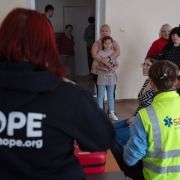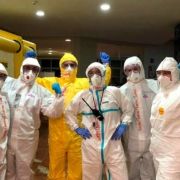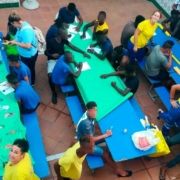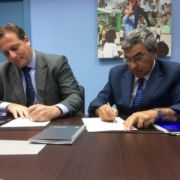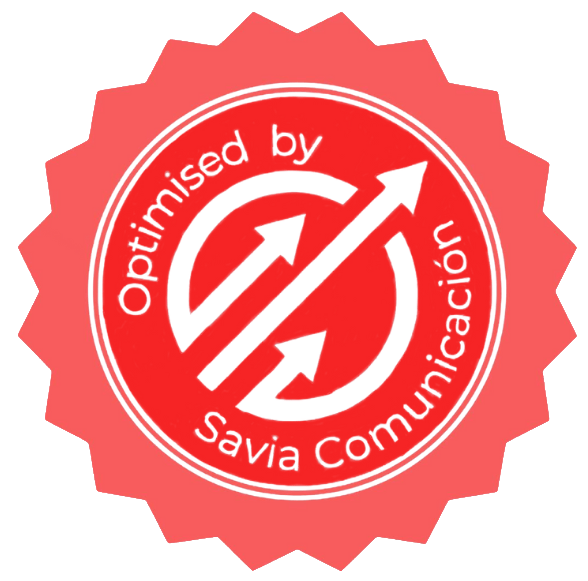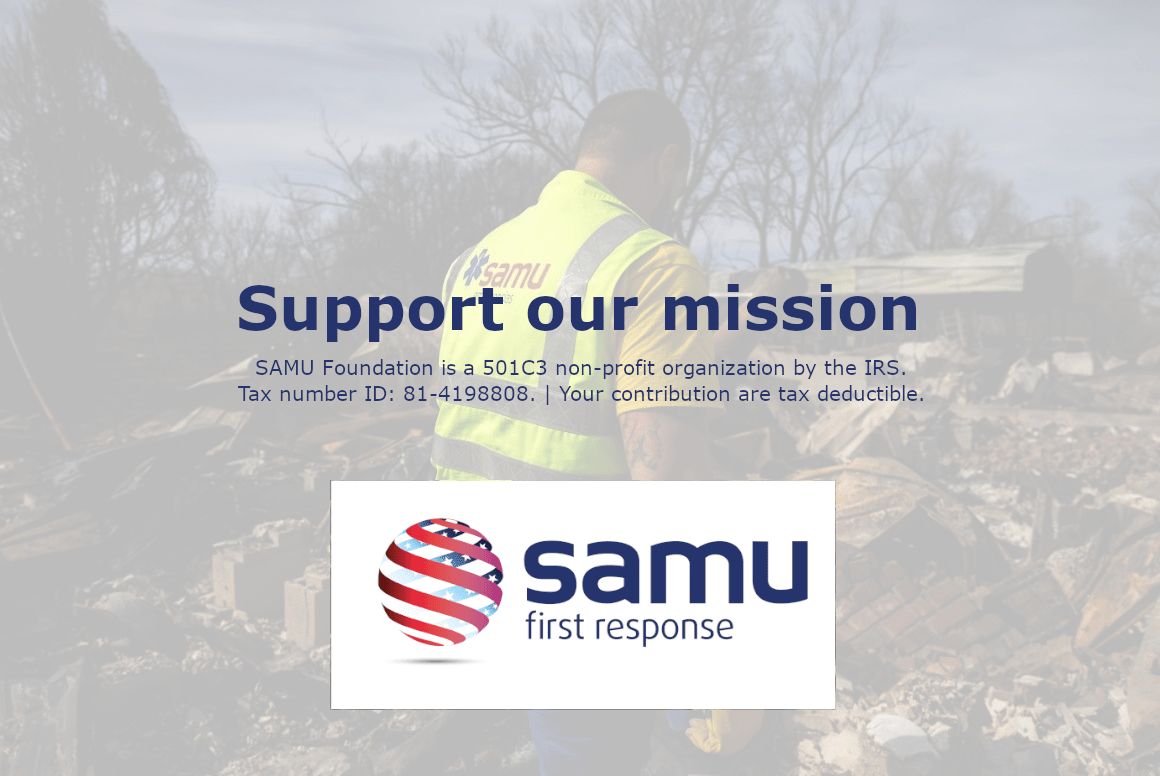The Power of Trust
Trust is foundational to what non-profit organizations do. It matters in every aspect of operations, beginning with the interpersonal relationships required when building teams. Simon Sinek, author of Leaders Eat Last, writes, “A team is not a group of people who work together. It is a group of people who trust each other.”
Employees need to trust their leadership to forward the mission and prevent turnover. Similarly, when volunteers trust an organization, they will go out of their way to support their work. Trust also matters when seeking financial support. Every dollar or in-kind donation that is given to an organization is born of trust. In fact, in a publication titled, The Future of Trust, the international professional services company Deloitte reported that “trustworthy companies outperform non-trustworthy companies by 2.5 times.”
But there is perhaps no place more critical for trust to exist than in the creation of strategic partnerships.
SAMU has a long history of forging such relationships, including with fellow NGO, Project HOPE. Harley Jones is Project HOPE’s Senior Manager of Domestic Operations. He oversees the organization’s programming in the United States.
“Trust is essential in our work because we are not selling products. We are organizations that are made up of humanitarians and good people, focused on alleviating human suffering at the worst times of their lives,” Jones said.
With two decades of experience in this field, Jones has seen partnerships that work, and others that fail. “There are a number of organizations that don’t like collaborating because it takes attention away [from them],” He said. But that’s just one of several factors that can lead to failure. Sometimes, Jones explained, the values and mission of the partners are just too different. Motives get questioned, and the lack of trust becomes an obstacle. “At the end of the day,” Jones said, “Mission is important,” explaining that – when values and mission align – it creates the perfect environment for a partnership to flourish.
“You build that trust internally,” He said. “You know when you face a barrier, that other organization is often going to view it in the same way you do. That creates the opportunity to work together in other areas because you can go into it with that understanding without having to work around it. It’s that place where your values converge with your approach, your compassion and your focus on mission.”
The Start Of A Beautiful Friendship
A mutual partner introduced SAMU to Project HOPE in 2017. The similarities between the organizations were evident immediately. “As two globally-based NGOs,” Harley Jones said, “Our focus has been on various places around the world, supporting vulnerable populations fleeing armed conflict or natural disaster.”
SAMU and Project HOPE began looking for ways they might partner. It didn’t take long to identify an opportunity. In November of 2018, Juan González de Escalada Álvarez, Grupo SAMU’s Director of Operations Grupo Samu’s and Director of SAMU School, headed to Venezuela on what would become the first of many joint operations.
“I was asked to enter Venezuela with them to ascertain the Venezuelan Migrant Crisis,” He said. “We spent several days around Cúcuta in Colombia and the Venezuelan region of El Táchira.” The teams were exploring whether SAMU could provide Health Emergencies Training to local humanitarian organizations managing a large influx of displaced Venezuelans.
That venture led to a significant partnership toward the end of 2020 in Honduras. The country was reeling from the socio-economic impacts of the COVID-19 pandemic when Tropical Storm Eta hit, followed closely by Hurricane Iota. The Pan American Health Organization and World Health Organization (PAHO/WHO) activated Emergency Medical Teams to assist with the resulting crisis. SAMU joined that mission, with Project Hope partnering to provide the financial support that allowed SAMU’s team to meet the needs of nearly 1,200 patients.
Most recently, Project HOPE supported SAMU in Moldova and Romania, where our teams on the ground provided support to refugees fleeing the war in Ukraine. During this joint mission, the teams were able to provide three and a half months of care for migrants affected by the crisis. Project HOPE provided 60 percent of the funding necessary for SAMU to perform more than 2000 medical consultations.
Jones explained that the relationship between Project Hope and SAMU was a natural fit because of how well the strengths of the organizations align. Jean Oelwang, president and founding CEO of Virgin Unite, describes in her book, Partnering, how that alignment cultivates something she calls “Deep Connections.”
“Deep Connections are relationships of purpose that make us who we are,” She writes. “They are the enduring ‘got your back’ friendships found in all aspects of our lives. These relationships help us become our best selves and multiply the impact we make in the world.”
On Mission Every Day
Project HOPE’s mission is simple, but critically important: Empower frontline health care workers. Prior to the pandemic, the organization’s main focus had been geared toward vulnerable populations in the developing world. Covid travel restrictions rendered that work nearly impossible, requiring the organization to pivot toward domestic assistance.
Jones said that, during this time, the NGO leaned heavily on their robust emergency response capability to help provide surge staffing to support frontline workers in some of the hardest hit areas, including Chicago/Cook County, Harris County in Texas and within the Navajo Nation. A strong supply chain allowed the organization to provide more than 18 million pieces of PPE across 15 countries in 2021 alone. “We know enough about the work that we do to know that it has to be needs-based and it has to be fast,” Jones said. Other organizations are not that nimble, he explained, which is why Project HOPE was so drawn to partnering with SAMU. The migrant crisis in Washington, D.C., is a prime example. Although SAMU was in the United States hoping to open the organization’s first unaccompanied minor shelter on American soil, the teams on the ground were able to change gears quickly to tackle a new mission: Meeting the needs of thousands of migrants being bussed to the Nation’s capitol from the border of Mexico.
Meeting Crisis Head-On … Together
As SAMU First Response transitioned into a leadership role in addressing Washington, D.C.’s unfolding migrant crisis – which Mayor, Muriel Bowser, later would declare a state of emergency – one of the first calls made was to Project HOPE. Jones remembers that call, and the very direct and clear asks that were made.
“We need some capacity-building and support around logistics,” Jones remembers the SAMU team saying, which he shares is Project HOPE’s specialty – particularly when it comes to government funding. The organization runs $10 Million in programming with the federal government and has extensive experience with the reporting and documentation necessary when managing federal dollars.
SAMU First Response’s Respite Manager, Jeisson Cartagena, adds that the procurement process also presented a challenge for the growing team. “I didn’t have that much information on how to navigate government funding,” He said. “Project HOPE had that experience and was able to send someone to work with our team to help us better understand the process.”
Jones recalls SAMU’s second ask: “We need some training around the stress, mental health and resiliency of our staff. We need tools that can help them take care of themselves and the people they are serving.” Project HOPE responded, providing classes on a variety of topics, from psychological first aid and gender-based violence, to sexual exploitation and de-escalation.
Cartagena remembers the resiliency training provided by Project HOPE as being extremely impactful for the staff. Migrants staying in SAMU’s respite center had been sharing stories of the violence, including sexual, experienced during their journey.
“It created so much pressure for the staff,” He said. “Just hearing the stories… they did not know how to answer. We were hearing this information and keeping it to ourselves. That was the worst part of this work. It was really, really hard for our team.”
The resiliency workshop coupled with the psychological first aid training helped the SAMU team begin to understand the psychological process guests in their were experiencing. Cartagena said it shed light on why they might act a certain way and how to address issues as they arose.
“That was important,” He explains, “Because it gave us the tools for how to handle this process. It is something we cannot change, but we can listen and put ourselves in their shoes. Just listening is the best way that we can help them. Now we are able to better care for our guests, and separate what is happening at work from our home lives.”
The final ask was perhaps the most critical, as buses previously bound for Union Station – a transportation hub in the heart of the city – began dropping migrants near the Naval Observatory and private residence of U.S. Vice President Kamala Harris. The immediate surrounding area is largely unpopulated and migrants dropped without notice struggled to know where to go for assistance upon arrival. Jones remembers SAMU’s request around this challenge distinctly: “We need a large vehicle that can move people.”
In less time than than anyone would believe, the keys to a 14-passenger van were being handed to Cartagena. “Project HOPE was really focused on getting us the best possible option,” He said, adding that, suddenly, the weight of trying to arrange reliable transportation was lifted. Picking people up from wherever they were dropped off was no longer an issue, but that gift provided so much more.
We can now take people to medical appointments. We can take them to Baltimore to change their address with ICE,” Cartagena said. “I was feeling like it was helping me to do my job better every day. I was feeling like it was for me, even though it was for SAMU. [Project HOPE] told me something like, ‘I hope this helps to make your job easier.’ And definitely it did.”
Jones says that partnering in this space has only increased the organization’s interest in further supporting SAMU’s work. As the trust between the NGOs grows, so does the value of the partnership between SAMU and Project HOPE.
“It has made it even stronger,” Jones said. “Our relationship and trust were built on years of working together around the world. We have [now] shown that we can continue to work together in the United States. As SAMU looks to increase and expand their work here, Project HOPE stands ready, willing and able to support that work in any way we can.

